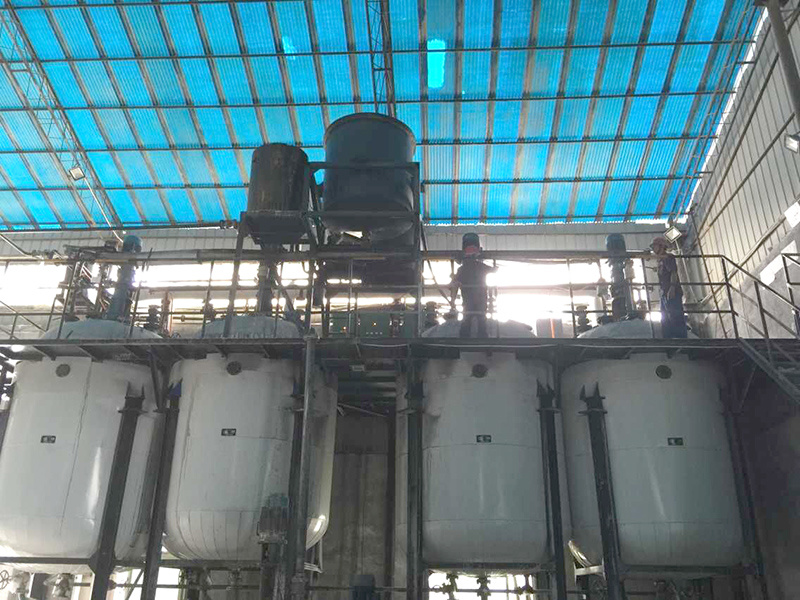Why Your Business Needs a Reliable Tripolyphosphate Supply Chain for Sustainable Growth
2025-08-02
Why Your Business Needs a Reliable Tripolyphosphate Supply Chain
The Importance of Tripolyphosphate in Various Industries
Tripolyphosphate, often referred to as TPP, is an essential inorganic compound utilized across various sectors, including agriculture, food processing, pharmaceuticals, and detergents. Its versatile applications stem from its unique chemical properties, making it a crucial ingr

Why Your Business Needs a Reliable Tripolyphosphate Supply Chain
The Importance of Tripolyphosphate in Various Industries
Tripolyphosphate, often referred to as TPP, is an essential inorganic compound utilized across various sectors, including agriculture, food processing, pharmaceuticals, and detergents. Its versatile applications stem from its unique chemical properties, making it a crucial ingredient in numerous formulations.
Understanding Tripolyphosphate: Composition and Properties
Tripolyphosphate is a salt formed from the condensation of three phosphate units, exhibiting a molecular formula of Na5P3O10. This compound plays a significant role in:
- **Emulsification**: Enhancing the stability of mixtures in food products.
- **Water Softening**: Reducing hardness in water for detergents and cleaning agents.
- **Nutrient Delivery**: Serving as a phosphate source in fertilizers, aiding plant growth.
Understanding the composition and properties of tripolyphosphate highlights its significance in manufacturing reliable products and processes.
The Role of Tripolyphosphate in Food and Beverage
In the food industry, tripolyphosphate acts as a preservative, stabilizer, and texture enhancer. It is commonly found in processed meats, seafood, and dairy products. Its ability to retain moisture and improve texture makes it invaluable, particularly in products that require a longer shelf life.
Benefits of Using Tripolyphosphate in Food Processing
1. **Preservation**: Inhibits microbial growth and extends shelf-life.
2. **Texture Improvement**: Enhances mouthfeel and product consistency.
3. **Nutritional Enhancement**: Serves as a source of phosphorus for fortified foods.
Having a consistent supply of tripolyphosphate ensures that food manufacturers can meet regulatory standards while delivering high-quality products to consumers.
Tripolyphosphate in Agriculture: A Vital Nutrient Source
In agriculture, tripolyphosphate is a crucial component of fertilizers. Phosphorus is an essential nutrient for plants, promoting root development and flowering.
The Benefits of Tripolyphosphate Fertilizers
- **Enhanced Growth**: Increases crop yield and quality.
- **Soil Health**: Improves soil structure and nutrient availability.
- **Sustainability**: Supports environmentally friendly agricultural practices.
Ensuring a reliable supply chain for tripolyphosphate fertilizers helps farmers maintain consistent productivity and supports sustainable farming practices.
Tripolyphosphate in Detergents and Cleaning Agents
The detergent industry relies heavily on tripolyphosphate for its water-softening properties. Hard water can hinder the effectiveness of detergents, but adding TPP helps to counteract this issue, ensuring that cleaning agents perform optimally.
Advantages of Tripolyphosphate in Detergent Formulations
1. **Improved Cleaning Efficiency**: Enhances the performance of surfactants.
2. **Calcium and Magnesium Ion Sequestration**: Prevents mineral buildup in fabrics and surfaces.
3. **Cost-Effectiveness**: Reduces the amount of detergent needed to achieve desired results.
A dependable tripolyphosphate supply chain is crucial for detergent manufacturers aiming to deliver high-performance cleaning products.
Challenges in Securing a Tripolyphosphate Supply Chain
Despite its importance, businesses often encounter challenges in maintaining a reliable tripolyphosphate supply chain. These challenges can include:
- **Market Fluctuations**: Variability in pricing and availability can disrupt production schedules.
- **Regulatory Compliance**: Changes in regulations can affect sourcing and usage.
- **Quality Control**: Inconsistencies in raw material quality can impact final products.
Navigating these challenges requires strategic planning and partnership with reliable suppliers.
Strategies for Building a Reliable Tripolyphosphate Supply Chain
To mitigate the risks associated with tripolyphosphate supply chains, businesses should consider implementing several strategies:
Diversify Suppliers
Establishing relationships with multiple suppliers can reduce dependency on a single source and increase negotiating power.
Invest in Long-Term Contracts
Securing long-term contracts can stabilize pricing and ensure availability during peak demand periods.
Implement Quality Assurance Programs
Regular quality assessments of incoming materials can help maintain high standards and prevent production delays.
Leverage Technology for Supply Chain Management
Utilizing advanced supply chain management software can improve visibility, streamline operations, and enhance communication with suppliers.
Case Studies: Successful Tripolyphosphate Supply Chain Management
Examining real-world examples of businesses that have effectively managed their tripolyphosphate supply chains can provide valuable insights:
Case Study 1: An Agricultural Giant
An agricultural company successfully diversified its suppliers, reducing costs by 15% and improving product consistency. By fostering relationships with different phosphorous sources, they ensured a steady supply of tripolyphosphate, enabling them to meet growing demands.
Case Study 2: A Leading Food Manufacturer
A food processing company implemented stringent quality control measures, resulting in a 20% decrease in product recalls related to ingredient quality. By prioritizing supplier reliability and material quality, they maintained their reputation for excellence.
Future Trends in Tripolyphosphate Supply Chain Management
As industries continue to evolve, so too will the landscape of tripolyphosphate supply chains. Key trends to watch include:
- **Sustainability Initiatives**: Increased demand for environmentally friendly sourcing practices.
- **Technological Integration**: The rise of AI and automation in supply chain logistics.
- **Global Market Dynamics**: The impact of geopolitical factors on sourcing and pricing.
Staying informed about these trends will enhance a business's ability to adapt and thrive in a competitive market.
Frequently Asked Questions (FAQs)
1. What is tripolyphosphate used for?
Tripolyphosphate is used primarily in food processing, agriculture as a fertilizer, and in the manufacturing of detergents and cleaning agents.
2. How does tripolyphosphate benefit agriculture?
It provides a crucial source of phosphorus, promoting plant growth, enhancing yield, and improving soil health.
3. What challenges are associated with the tripolyphosphate supply chain?
Challenges include market fluctuations, regulatory changes, and maintaining consistent quality control.
4. How can businesses secure a reliable tripolyphosphate supply chain?
By diversifying suppliers, investing in long-term contracts, implementing quality assurance programs, and leveraging technology.
5. What future trends should businesses consider in tripolyphosphate supply chain management?
Key trends include sustainability initiatives, technological integration, and the impact of global market dynamics.
Conclusion
A **reliable tripolyphosphate supply chain** is not merely a logistical concern; it is a strategic asset that can significantly impact a business's success across various industries. By understanding the importance of tripolyphosphate, addressing supply chain challenges, and implementing effective management strategies, companies can position themselves for long-term growth and innovation. As the market evolves, staying ahead of trends and maintaining strong supplier relationships will be crucial for navigating the complexities of the tripolyphosphate supply chain. Investing in these areas will ensure that your business remains competitive and resilient in an ever-changing landscape.
PREVIOUS:


 TESFA STPP
TESFA STPP